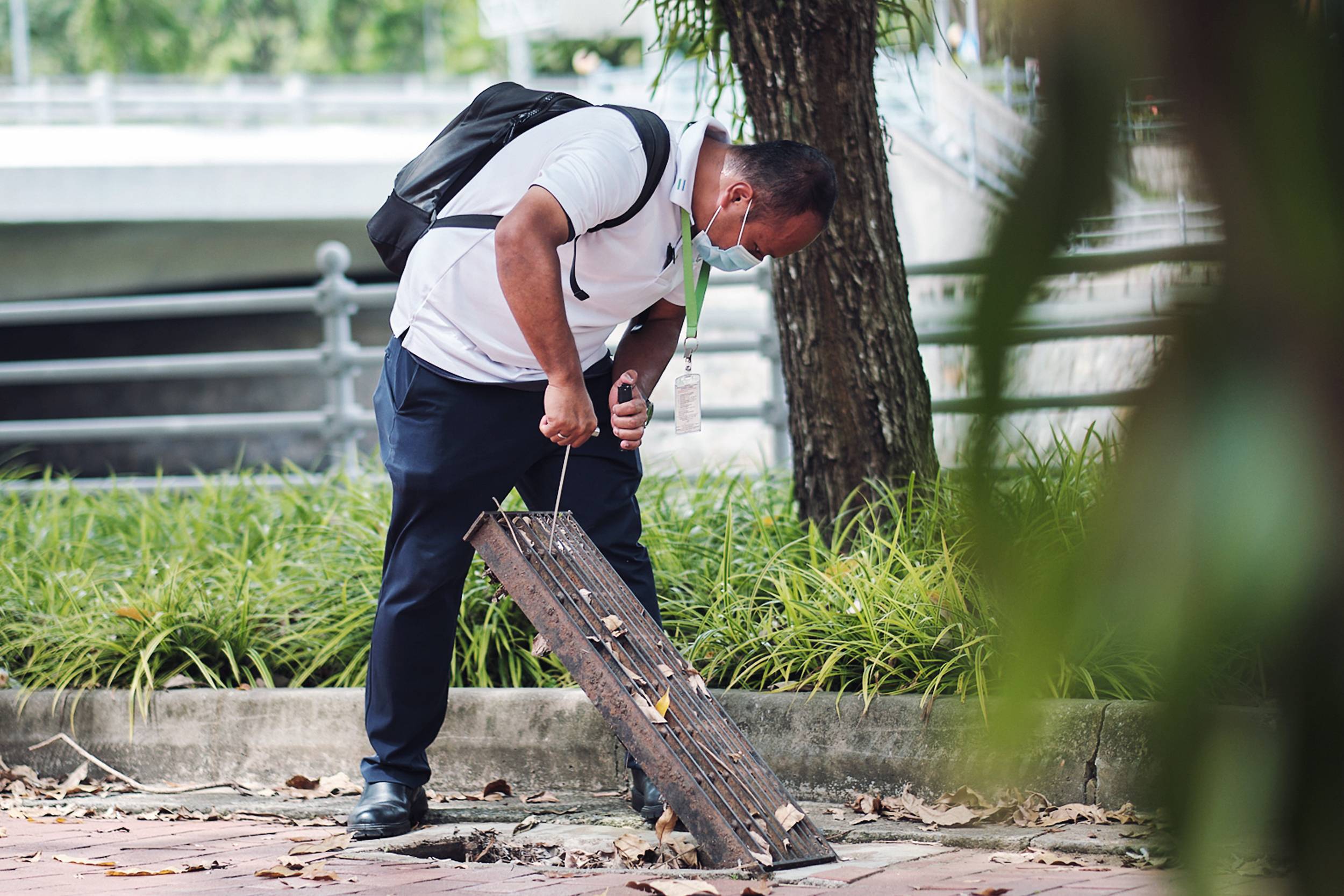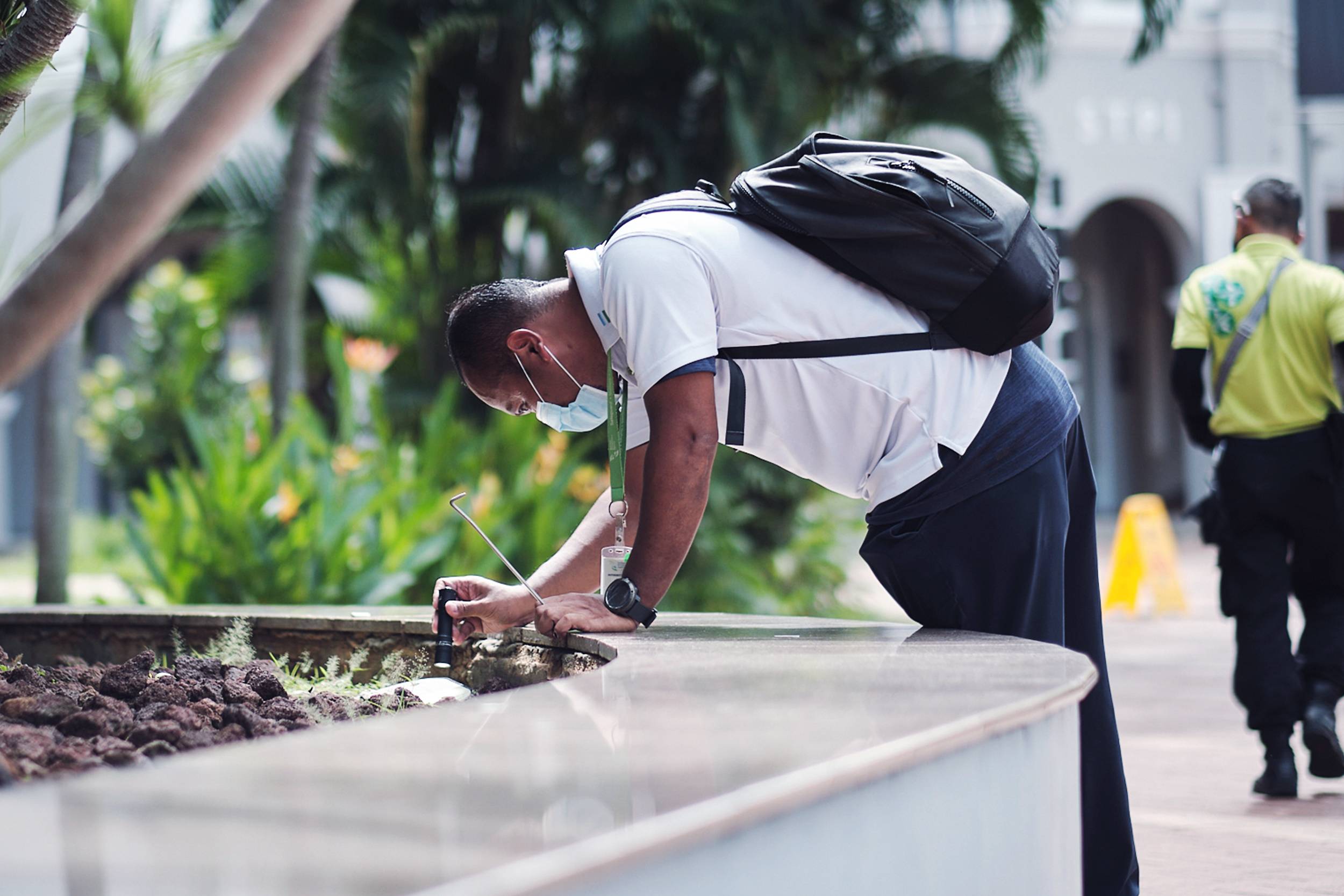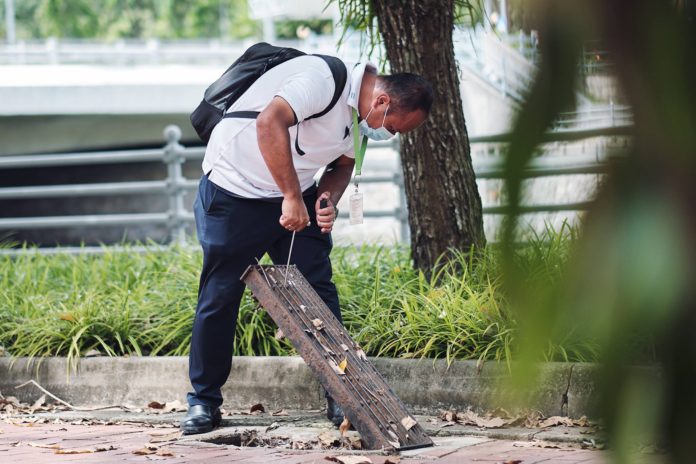SINGAPORE: The National Environment Agency (NEA) has launched an “intensive” two-week vector control to break dengue transmission as the number of cases appears set to surge beyond Singapore’s worst outbreak in 2013.
As of Thursday (Jul 23), there were nearly 20,000 dengue cases this year, with the number of cases “escalating”, NEA said in a media release on Friday. The number of cases is set to surpass the 22,170 cases reported in 2013 – Singapore’s worst outbreak.
With more than 600,000 households located in more than 400 dengue clusters islandwide, the NEA said an “urgent collective” community effort is “critical” to bring down case numbers.
READ: Transport Minister Khaw Boon Wan hospitalised for dengue, tests negative for COVID-19
FOCUS ON HDB AREAS
As of Wednesday, there were 424 active dengue clusters in Singapore. About 45 per cent of the dengue cases in active clusters are in Housing Board (HDB) areas managed by town councils, NEA said.

NEA officer lifts up drain cover to check for mosquito breeding. (Photo: NEA)
These large dengue clusters include areas in Aljunied Road and Geylang Road, Bukit Panjang Ring Road, Arthur Road, Leicester Road and Potong Pasir Avenue 1, and Arnasalam Chetty Road and Kim Yam Road.
Some of these dengue clusters have a faster rate of disease transmission, the agency said, adding that there is an average of about two or three cases reported per day in the past two weeks.
“As we are in the warmer months of the year, we expect the high Aedes aegypti mosquito population to be sustained, unless additional efforts are taken to remove stagnant water in the environment and prevent mosquito breeding,” NEA said.
The agency said it is working with all town councils to set up dengue prevention efforts as part of an intensive two-week exercise islandwide.
They will step up inspections and vector control operations in common areas, such as ensuring drains are well maintained, common areas are kept litter free, and stagnant water is removed or treated.
READ: Anti-dengue Wolbachia mosquito project shows ‘promising results’; to cover all Tampines, Yishun HDB towns from July

NEA officer checks for mosquito breeding in common areas. (Photo: NEA)
“They are also urged to work with NEA to coordinate chemical treatment, such as fogging, misting and larviciding, in dengue clusters, to bring down the adult mosquito population,” the agency added.
Over the next fortnight, NEA will also work closely with grassroots advisers, leaders and community volunteers to reach out to more residents to get rid of mosquito habitats.
This includes reminding residents living in dengue cluster areas to apply mosquito repellent regularly, wear long-sleeve tops and trousers, and spray insecticide in dark corners around the home.
“Such protective measures are important given the surge in dengue cases, high mosquitoes population and with more people working from homes, which also means more blood meals for the day-biting dengue vector, the Aedes mosquitoes.”
READ: Number of dengue cases in 2020 so far surpasses 2019’s total count
MOSQUITO BREEDING HABITATS IN HOMES, CONSTRUCTION SITES
Between January and June this year, NEA conducted more than 454,000 inspections across Singapore, including 3,800 checks at construction sites.
Officers found about 11,700 mosquito breeding habitats in total.

NEA officer checks drain for mosquito breeding. (Photo: NEA)
One “particular concern” is the repeated mosquito breeding that NEA officers continue to find in homes. In the first six months of this year, about 150 of NEA’s subsequent inspections at residential premises found repeated Aedes mosquito breeding.
“Even more egregious are that 23 out of these 150 subsequent inspections also yielded multiple mosquito breeding habitats,” the agency said.
About 140 summonses and three Stop Work Orders were issued to construction sites, and five contractors will be charged in court for repeat offences.
READ: NEA takes enforcement action as ‘egregious mosquito breeding’ continues
More than 2,000 “enforcement actions” were also taken against owners of premises for mosquito breeding. NEA said it will continue to take “strong enforcement action” against premises where mosquito breeding is detected.
Since Jul 15, NEA has imposed heavier penalties for households found with repeated mosquito breeding offences, multiple mosquito breeding habitats detected during a single inspection, and mosquito breeding detected after having received a legal notice from NEA.
Enforcement has also been tightened for construction sites and town councils.

Collection of mosquito breeding. (Photo: NEA)
Senior Minister of State for the Environment and Water Resources Amy Khor said: “Community-led efforts play a key role in protecting our neighbourhoods.
“We have reached out to our community stakeholders to step up dengue prevention efforts to break transmission in large clusters.
“We have also mobilised all town councils, as well as local grassroots advisers and leaders, to organise and conduct patrols to check for potential mosquito breeding habitats in common areas around their neighbourhoods, and to conduct house visits to advise residents on common mosquito breeding habitats and share dengue prevention tips.
“They will also emphasise the use of mosquito repellent to protect ourselves, especially in dengue clusters, and to spray insecticide in homes. We need urgent collective community effort to prevent this situation from worsening.”





